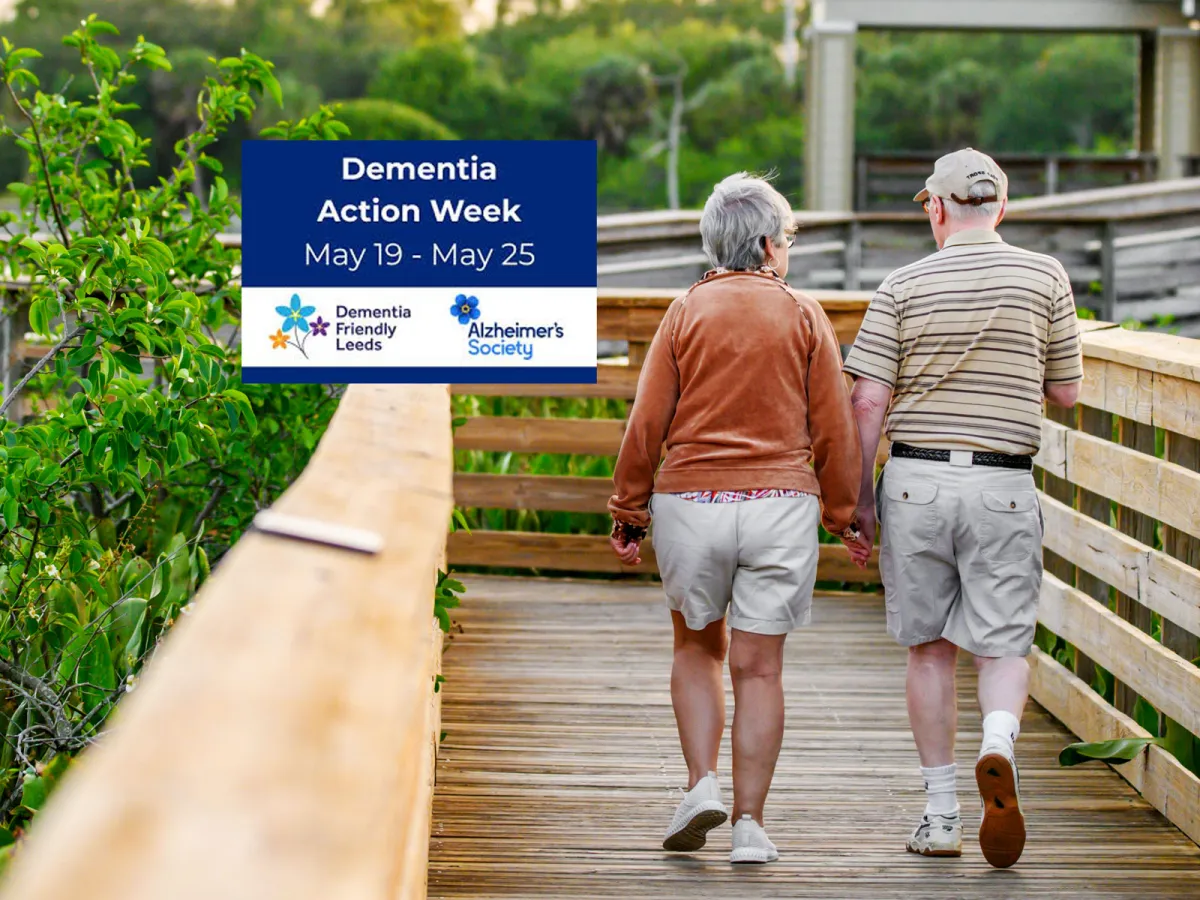
Understanding Frontotemporal Dementia and Continuing Healthcare
Frontotemporal Dementia – a challenging form of dementia
As part of Dementia Action Week, we’re continuing our four-part series exploring the most common types of dementia and how they intersect with the complexities of NHS Continuing Healthcare (CHC). Our previous blog posts covered Alzheimer's and Vascular Dementia. In this blog, we’re focusing on Frontotemporal Dementia (FTD). A less common but often misunderstood form of dementia that brings with it significant challenges for both individuals and families.
*Please note that this blog post is for information purposes only, and should not be a substitute for medical advice. If you suspect you or a loved one has Frontotemporal Dementia, please seek advice from a medical professional.*
At Winston Solicitors, we work with families who are navigating these difficult diagnoses and the sometimes overwhelming journey of securing the right support. With the help of our Continuing Healthcare expert James Urquhart-Burton, we aim to demystify the legal and clinical framework around FTD and show how CHC funding may be available to those living with its effects.
For expert CHC advice call 0113 320 5000
What Is Frontotemporal Dementia?
Frontotemporal Dementia (FTD) is an umbrella term for a group of disorders caused by progressive damage to the frontal and/or temporal lobes of the brain. These areas control behaviour, personality, language, and movement. Unlike Alzheimer's disease, which primarily affects memory, FTD tends to manifest first through changes in personality, emotional responses, and communication skills.

FTD is often diagnosed in people between the ages of 45 and 65, but it can occur earlier or later. Because of this younger onset, the impact can be especially distressing for individuals who are still working, raising families, or leading active social lives.
There are three main types of FTD:
- Behavioural variant FTD (bvFTD) - Affects behaviour and personality
- Semantic dementia - Affects understanding of language and meanings
- Progressive non-fluent aphasia (PNFA) - Affects speech and communication
Each presents differently, but all fall under the same diagnosis category and are caused by similar degenerative processes.
Common Symptoms of Frontotemporal Dementia
FTD symptoms vary widely, depending on which part of the brain is affected, but some of the most common signs include:
- Personality changes and disinhibition (saying or doing things that are socially inappropriate)
- Apathy or lack of interest in activities and relationships
- Impulsive behaviour and poor judgement
- Emotional bluntness or lack of empathy
- Changes in eating habits (such as sweet cravings or overeating)
- Difficulty understanding words or finding the right words
- Slow or effortful speech
- Repetitive or obsessive behaviours
It’s important to note that memory may remain relatively intact in the early stages, which can lead to delays in diagnosis or misinterpretation of symptoms.
Family members often describe the early stages as a subtle "personality shift." The individual may become less considerate, more socially awkward, or unusually blunt. These changes can be confusing and painful for loved ones, especially when they come out of the blue in someone who was once warm, considerate, and reliable.
Diagnosing FTD - Why It Can Be a Challenge
FTD can be difficult to diagnose because:
- It often begins with behavioural or emotional symptoms rather than memory loss.
- It can resemble psychiatric conditions like depression, bipolar disorder, or even autism spectrum traits.
- Younger age of onset may lead GPs to rule out dementia altogether.
Diagnosis typically involves:
- Neurological examination and cognitive assessments
- Brain imaging (MRI or PET scans)
- Psychiatric evaluation to rule out other causes
- Family history review (as around 1 in 3 FTD cases may be inherited)
If you suspect a loved one is displaying unusual behaviours or struggling with language in ways that seem out of character, it’s essential to seek specialist advice. A referral to a memory clinic or neurologist can be a vital step in getting the correct diagnosis.
Progression and Prognosis
FTD is progressive, meaning symptoms worsen over time. The average life expectancy after diagnosis is 6 to 8 years, though this can vary.
As the disease advances:
- Communication may become increasingly difficult.
- Physical symptoms such as muscle rigidity, tremors, or difficulty swallowing can develop.
- Incontinence and mobility problems may emerge.
- In the final stages, the person may become completely dependent on others for care.
There is no cure for FTD. Treatment focuses on managing symptoms, improving quality of life, and supporting the individual and their carers. This often involves a multi-disciplinary team of neurologists, speech and language therapists, occupational therapists, and dementia support workers.
For expert CHC advice call 0113 320 5000
Supporting Someone with Frontotemporal Dementia
Caring for someone with FTD can be incredibly demanding. The nature of behavioural symptoms means families may be dealing with:
- Aggression or socially inappropriate behaviour
- Lack of insight or refusal of help
- Safety concerns due to impulsive or risky actions
- Communication breakdowns
Because FTD often affects people in mid-life, there may also be additional financial pressures. The person may be forced to leave work early, while their partner becomes a full-time carer.
This is where planning ahead becomes crucial. Putting the right legal and financial structures in place early can make a huge difference to long-term outcomes. That’s where NHS Continuing Healthcare may be relevant.
What Is NHS Continuing Healthcare (CHC)?
NHS Continuing Healthcare (CHC) is a fully funded package of care provided by the NHS for people with significant health needs. Unlike social care, CHC is not means-tested. Eligibility is based on health needs alone, not your income or assets.
If your loved one with FTD has intense, complex, or unpredictable care needs, they may be eligible for CHC. This funding can cover:
- Nursing home care
- Domiciliary (at-home) care
- Equipment and adaptations
- Support from specialist health professionals.
Why Frontotemporal Dementia Should Be Considered for CHC
Frontotemporal dementia can involve highly complex behavioural and psychological symptoms that make care particularly challenging. CHC eligibility should absolutely be considered where:
- There are intense behavioural needs, such as aggression, impulsiveness, or resistance to care
- The individual poses a risk to themselves or others
- There are significant communication or language barriers
- Skilled carers are needed to manage unpredictable episodes of distress or physical need
- The person requires continuous supervision and specialist interventions
Sadly, CHC applications are frequently rejected on the basis that care needs are deemed "social" rather than "health" related. But in many FTD cases, the degree of specialist care required and the risks involved are very clearly health-related.
It’s important to advocate for your loved one and to challenge incorrect decisions. At Winston Solicitors, we’ve supported many families through the appeals process and successfully secured CHC funding in complex dementia cases.
The Role of Legal Planning
In addition to seeking CHC representation, families should also consider talking to a Wills, Trusts & Probate specialist. Our private client team can help you with:
- Lasting Powers of Attorney (LPAs) - These allow trusted individuals to make decisions about health, welfare, and finances when the person is no longer able to do so.
- Wills - Making or updating a Will ensures that assets are protected and wishes respected.
- Advance care planning - Documenting preferences for care, treatment, and end-of-life decisions.
The earlier these steps are taken, the better. Once FTD progresses and the person loses capacity, it becomes much more difficult (and sometimes impossible) to put these protections in place.
How Winston Solicitors Can Help
We understand how disorienting a diagnosis of Frontotemporal Dementia can be. You may feel unsure where to turn, overwhelmed by paperwork, or frustrated by the hurdles involved in accessing help.
Our experienced team can:
- Help you determine whether CHC is appropriate for your loved one
- Guide you through the CHC assessment process
- Support you with appeals if a decision is unjustly denied
- Work alongside your healthcare team to ensure a joined-up approach to care planning.
It may also be beneficial to speak to our Private Client team. They can help you to put in place Powers of Attorney and Wills.
A Final Word for Dementia Action Week
FTD is often misunderstood, underdiagnosed, and poorly supported. But you are not alone. If your family is dealing with the impact of Frontotemporal Dementia, we’re here to help.
Dementia care should never be a postcode lottery, nor should families be left to shoulder the burden alone. With the right legal and financial support, you can focus on what truly matters - supporting your loved one with dignity, care, and compassion.
If you think your loved one may be eligible for NHS Continuing Healthcare due to Frontotemporal Dementia, contact our team today for advice and guidance.

